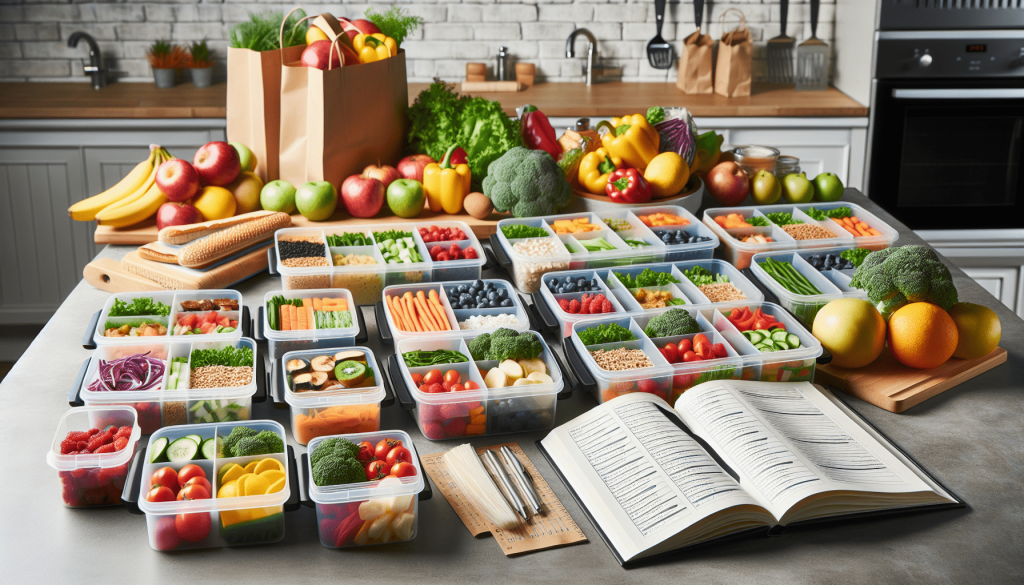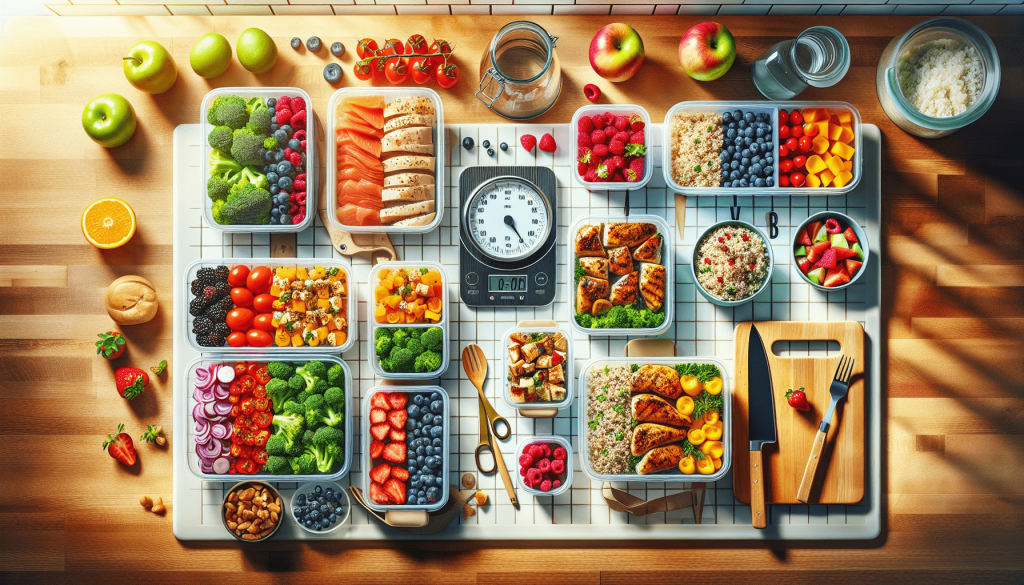In this article, you will discover the most effective strategies for meal prepping that will help you stay organised and nourished throughout the entire week. With busy schedules and hectic lifestyles becoming the norm, finding ways to simplify meal planning and preparation is essential. Whether you are a beginner or a seasoned meal prepper, these tips and tricks will guide you towards creating delicious and nutritious meals that are ready to enjoy whenever you need them. Say goodbye to last-minute takeaways and hello to a stress-free and healthy week ahead!

Plan Your Meals
When it comes to meal prepping for the week ahead, the first step is to plan your meals. By taking the time to choose recipes in advance, you can ensure that you have all the ingredients you need and avoid any last-minute trips to the grocery store. Consider your dietary needs and restrictions, such as allergies or preferences, and select recipes that cater to them. This will help you stick to your meal plan and avoid any unnecessary food waste. Once you have chosen your recipes, create a detailed meal plan for the week, specifying which meals you will have each day. This will help you stay organized and ensure that you have a variety of meals throughout the week. Lastly, make a shopping list based on your meal plan. This will help you stay focused at the grocery store and prevent you from purchasing unnecessary items.
Grocery Shopping
One of the key aspects of successful meal prep is having all the necessary groceries on hand. To avoid last-minute trips to the store and save time throughout the week, it is important to shop for groceries in advance. Dedicate a specific day or time each week for your grocery shopping, and make it a priority to stick to this routine. When shopping, consider buying certain items in bulk when possible. This can help save money in the long run and ensure that you have enough ingredients for multiple meals. Additionally, choosing seasonal ingredients can not only enhance the flavor of your meals but also save you money. Seasonal produce is often cheaper and more readily available. Lastly, stick to your shopping list. Avoid impulse purchases and stick to the items that you need for your planned meals. This will help you stay on budget and prevent food waste.
Prep Ingredients
Once you have your groceries, it’s time to prep your ingredients. This step can save you time during the busy week ahead and make cooking a breeze. Start by washing and chopping your vegetables. This way, they will be ready to go when you need them, saving you precious minutes in the kitchen. If you plan on including meats or proteins in your meals, consider marinating them in advance. This can enhance the flavor and allow the flavors to penetrate the meat, making it even more delicious. Additionally, pre-cook any grains or legumes that you will be using. This can help speed up the cooking process during the week and allow you to have meals ready in a flash. Finally, divide your ingredients into portions. This can be especially helpful if you are meal prepping for an individual or have specific portion sizes in mind. By organizing your ingredients in portioned containers, you can easily grab what you need when it’s time to cook.
Storage Containers
Investing in good quality storage containers can make a world of difference when it comes to meal prepping. Look for containers that are microwave and freezer-safe, as this will allow you to easily heat up your meals and store them for longer periods of time. Clear containers are also a great choice, as they allow for easy visibility. Being able to see what is inside each container can help you quickly identify what you need and prevent any confusion. When storing your prepared meals, it’s important to label each container with the date and contents. This will help you keep track of the freshness of your meals and avoid any unpleasant surprises. By investing in the right storage containers and practicing proper labeling, you can ensure that your meals stay fresh and organized throughout the week.

Cook in Batches
Cooking in batches is a meal prep strategy that can save you a significant amount of time and effort. By cooking multiple meals at once, you can maximize your efficiency in the kitchen and have meals ready for the entire week. Utilize appliances such as your oven, slow cooker, or Instant Pot to cook multiple dishes simultaneously. Each appliance has its own strengths and can help you cook a variety of meals. Allocate specific days for cooking, such as a Sunday afternoon, and dedicate that time to preparing your meals for the week. Once your meals are cooked, store them in portioned containers for easy access and convenience. This way, you can simply grab a meal when you’re hungry and reheat it when needed. Cooking in batches can make your weeknights much less stressful and ensure that you always have a delicious meal ready to enjoy.
Freezing Meals
Freezing meals is a great way to extend their shelf life and provides you with a variety of options throughout the week. Portion out your meals into individual servings before freezing them. This allows for easy reheating and prevents wasting any leftovers. Use freezer-safe bags or containers to store your meals. Be sure to write down any cooking instructions on the containers, so you know how to properly prepare the meals when it’s time to eat. Additionally, don’t forget to label each container with the date. This way, you can keep track of the freshness of your frozen meals and use them in a timely manner. Freezing meals not only adds convenience to your meal prepping routine but also helps reduce food waste.
Reheating and Serving
When it’s time to enjoy your prepped meals, it’s important to follow proper reheating guidelines to ensure food safety. Always refer to the recommended cooking instructions for each meal and make sure that it is thoroughly heated before consuming. Reheating your meals can be done in the microwave or oven, depending on your preference and the type of meal. If you prefer a crispy texture, the oven is a great option, while the microwave offers quick and convenient heating. To enhance the flavor of your meals, consider serving them with fresh toppings or condiments. This can add a burst of flavor and variety to your meals, making them even more enjoyable. By following proper reheating guidelines and adding creative touches to your dishes, you can savor your prepped meals throughout the week.
Avoiding Food Waste
Meal prepping is not only a great way to save time but also to reduce food waste. When it comes to avoiding food waste, there are several strategies you can employ. First, use leftover ingredients in creative ways. For example, leftover vegetables can be turned into a tasty stir-fry or used as toppings for salads. Repurposing meals into new dishes is another great way to prevent waste. For instance, leftover roasted chicken can be shredded and used in sandwiches or wraps. If you have any food scraps that cannot be used, consider composting them. This helps divert waste from landfills and creates nutrient-rich compost for your garden. Lastly, practice proper food rotation. When organizing your fridge and pantry, always place newer items behind older ones. This way, you can ensure that you are using up the older ingredients before they expire, reducing food waste in the process.
Variety and Balance
Maintaining variety and balance in your prepped meals is key to a successful meal prep routine. Include a variety of proteins, vegetables, and grains to ensure that you are getting a well-rounded diet. Experiment with different cuisines and flavors to keep your meals exciting and prevent food fatigue. Consider the nutritional balance and portion sizes of your meals, aiming for a balance of protein, carbohydrates, and healthy fats. This will help keep you satisfied and energized throughout the day. Avoid repetitive meals by incorporating different ingredients and flavors into your recipes. By focusing on variety and balance, you can ensure that your prepped meals are both nutritious and enjoyable.
Storage and Shelf Life
Knowing how to properly store your meals and understanding their shelf life is crucial for maintaining their freshness and quality. When storing your meals in the fridge, be sure to consume them within 4-5 days to ensure their safety. For longer-term storage, freezing your meals is the best option. Frozen meals can generally be kept for several weeks or even months, depending on the type of meal. However, it is important to be mindful of expiration dates and regularly clean and organize your fridge and freezer. This will help you keep track of what needs to be consumed and maintain optimal freshness. By properly storing your meals and staying aware of their shelf life, you can enjoy your prepped meals with confidence and avoid any food safety concerns.
In conclusion, meal prepping is a fantastic way to save time, minimize food waste, and ensure that you always have delicious and nutritious meals ready to enjoy throughout the week. By following these best practices, such as planning your meals, shopping in advance, prepping ingredients, and storing your meals properly, you can streamline your meal prep routine and make your week much easier. With a little bit of planning and organisation, you can experience the many benefits of meal prepping and enjoy tasty homemade meals every day. Happy prepping!
